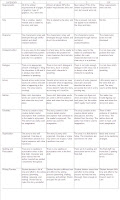Read the entire list of words below. Choose at least
three of the words to use them as titles. Then write the poems. Post them to your blog by the end of the period.
archipelago (ar-kah-PEL-ah-go) — 1. a large group of islands. 2. a sea, such as the Aegean, containing a large number of scattered islands
cacophony (kah-KOF-ah-nee) — 1. jarring, discordant sound; dissonance. 2. the use of harsh or discordant sounds in literary composition
caterwaul (KAT-er-wol) — 1. to utter long wailing cries, as cats in rutting time. 2. to utter a similar sound; howl or screech. 3. to quarrel like cats
conundrum (kah-NUN-drum) — 1. a riddle in which a fanciful question is answered by a pun. 2. a paradoxical, insoluble, or difficult problem; a dilemma
frangipani (fran-jah-PAN-ee) — 1. any of various tropical American deciduous shrubs or trees of the genus Plumeria, having milky sap and showy, fragrant, funnel-shaped, variously colored flowers. Also called temple tree. 2. a perfume derived from or similar in scent to the flowers of one of these shrubs or trees. 3. also fran·gi·pane (FRAN-jah-pan) a creamy pastry filling flavored with almonds
jocularity (JOK-yah-lar-i-tee)
— joking speech or behavior
kismet (KIZ-met) — fate; fortune
loam (LOM) 1. soil composed of a mixture of sand, clay, silt, and organic matter. 2. a mixture of moist clay and sand, and often straw, used especially in making bricks and foundry molds
megalomaniac (meg-ah-lo-MAN-ee-ak) — 1. a person with a psychopathological condition characterized by delusional fantasies of wealth, power, or omnipotence. 2. a person who has an obsession with grandiose or extravagant things or actions
necromancy (NEK-roh-man-see) — 1. the practice of supposedly communicating with the spirits of the dead in order to predict the future. 2. black magic; sorcery. 3. magic qualities
phalanges (pha-LAN-jeez) — a bone of a finger or toe
rambunctious (ram-BUNGK-shes) boisterous and disorderly
ricochet (RIC-ah-shay)
— to rebound
sarcophagus (sar-KOF-ah-ges) — an above-ground stone coffin, often inscribed or decorated with sculpture
sprocket (SPROK-it) — 1. any of various toothlike projections arranged on a wheel rim to engage the links of a chain. 2. a cylinder with a toothed rim that engages in the perforations of photographic or movie film to pull it through a camera or projector
usurp (yoo-SURP) — 1. to seize and hold (the power or rights of another, for example) by force and without legal authority. 2. to take over or occupy without right
undulation (un-jah-LAY-shen)
— movement in waves; a wavy, curving form or outline
vertigo (VUR-ti-go) — 1. the sensation of dizziness; an instance of such a sensation. 2. a confused, disoriented state of mind
Homework: Create a list of words that you like. You must have at least 25 words on your list.


